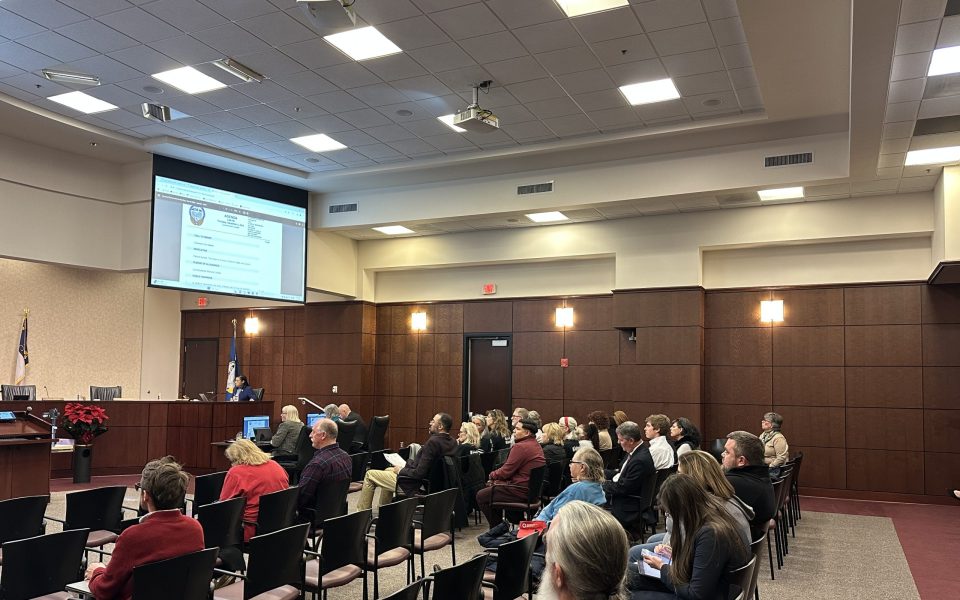Featured photo: Parents, educators and activists watch as commissioners cast their votes to fund the designs for a new Ashley Elementary. (Photo by Gale Melcher)
On Dec. 5, Forsyth County’s Board of Commissioners voted unanimously to send $700,000 to fund new designs for Ashley Elementary School, attended by predominantly Black and Latine students. It’s a welcome update for many who have been fighting for changes for the last decade. This is the first in a series of votes that the commission will make over the next couple of years to issue funding and fully replace the school.
Funding to replace Ashley Elementary was initially included in a $552.5 million bond proposed by staff to the school board in July 2015. In early 2016, some of Ashley’s students were being taught in mobile units and yet the school was still 136 students over capacity, with teachers reporting that mold was making them sick. But by spring 2016, the board had slimmed that figure down to $325.8 million, booting Ashley Elementary from the list of projects. This fueled outcry from parents and the community, culminating in the activism that has rallied around the project for nearly a decade. The group Action4Equity was born from the original Action4Ashley campaign; parents and supporters with the group looked on as the vote was cast.
Longtime Action4Equity advocate Rev. Paul Robeson Ford, who works on the team’s policy committee and special projects, spoke to TCB after the Dec. 5 vote, saying that this marks the start of a final process that is the “culmination of years of blood, sweat and tears so many people in this community have put into providing what has been overdue for the students, families and teachers of Ashley for so long.”
The longtime underfunding and neglect of Ashley Elementary demonstrates a nationwide issue, but particularly in southern states such as North Carolina.
A 2024 report by researchers identifies “chronically below adequate” districts, or those whose funding is the furthest below adequate. And around 60 percent of the nation’s students that are in these chronically underfunded districts are located in Alabama, Arkansas, Florida, Georgia, Louisiana, Mississippi, Nevada, New Mexico, North Carolina, and Texas, states that serve about 30 percent of the nation’s students.
“It is a testament to the power of grassroot organizing and collective actions as well as the persistent pressure that is required to draw attention to neglected and marginalized sectors of our community, and the needs that they have that are no different than the needs of any other part of the community,” Ford said.
Additionally, school districts attended predominantly by students of color receive $23 billion less annually than predominately white districts according to the nonprofit EdBuild, which studies US school funding.
Forsyth County’s own disinvestment in the east side of town and its history of racial covenants which prohibited Black people and other marginalized groups from purchasing property resulted in the underfunding of schools like Ashley.
But with this new action taken by the county commission, those who have been fighting for change hope that a new future can take shape.
Valerie Brockenbrough, a former county commission candidate who, along with the two other Democrats on the ticket, lost to the Republican incumbents, came to the commission meeting in support of Action4Equity and a new Ashley Elementary.
“It’s wonderful to see that moving forward because it’s been a long time coming,” said Brockenbrough.
All CityBeat reporting content is made possible by a grant from the NC Local News Lab Fund, available to republish for free by any news outlet who cares to use it. Learn More ↗
Republish this storyJoin the First Amendment Society, a membership that goes directly to funding TCB‘s newsroom.
We believe that reporting can save the world.
The TCB First Amendment Society recognizes the vital role of a free, unfettered press with a bundling of local experiences designed to build community, and unique engagements with our newsroom that will help you understand, and shape, local journalism’s critical role in uplifting the people in our cities.
All revenue goes directly into the newsroom as reporters’ salaries and freelance commissions.


Leave a Reply